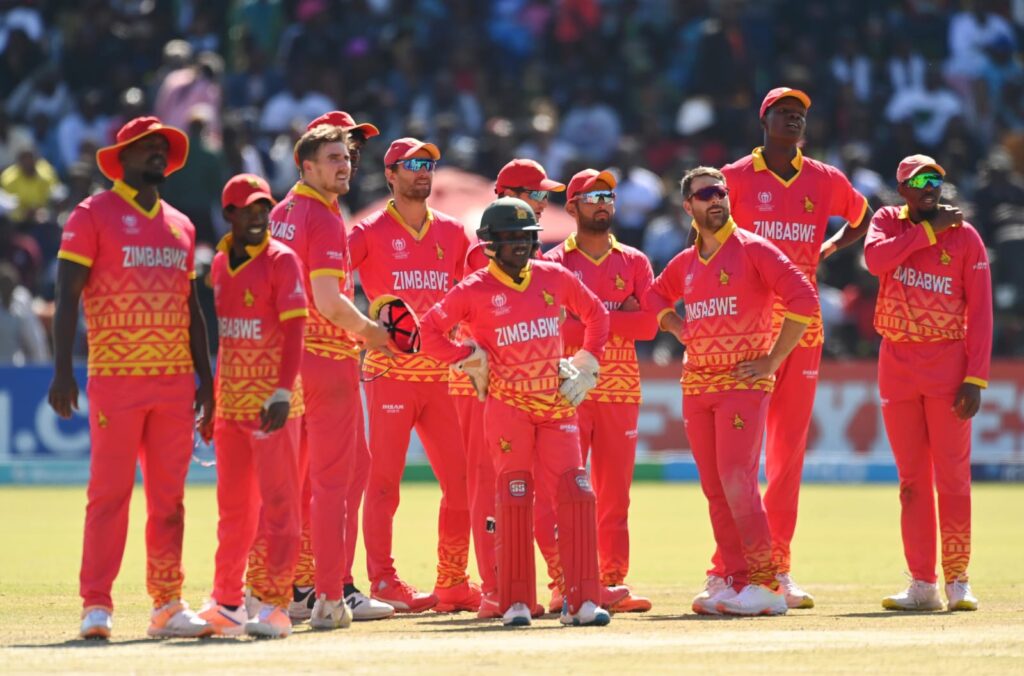
When the countdown to the World Cup ends in October, some of the talk will doubtless centre on a team that’s missing the showpiece event for the first time. West Indies’ absence is not dissimilar from Italy missing the last two FIFA World Cups, and is a sad indictment of the way the game has been run in the islands (and Guyana) over the past few decades. But there will be another team missing the big show in India – a side that have beaten Australia, India, England and South Africa in cricket’s marquee competition.
Duncan Fletcher was already 34 when he played his first ODI, and it was his 69 not out and 4-42 that inspired a stunning upset of Australia at Trent Bridge in Zimbabwe’s first World Cup game 40 years ago. In the years that followed, Zimbabwe would defeat England at the country venue of Albury (1992), and see off both India and South Africa on their way to the Super Sixes in 1999. They were also part of a dramatic tie in 2007 against Ireland, the new team on the block.
Those memories, however, are rapidly fading. You have to go back to 2015 for Zimbabwe’s last involvement on the big stage, and that campaign, which saw them beat only the UAE, was indicative of how far they had fallen since their best years in the late 1990s. When the present-day side started the World Cup Qualifier so strongly, with a blemish-free record in the group phase, hopes were high that Dave Houghton – the coach who was once a player of some repute in the 1980s – could lead them back to the big tent.
When Oman were then beaten in the first of the Super Six games, Zimbabwe were just a win away from glory. The crowd, whether at the Harare Sports Club or the Queens Sports Club in Bulawayo, were right behind the team, enthused by the big hitting and the air of optimism around the side led by Craig Ervine.
Then, just as they had in March 2018, during qualification for the 2019 World Cup, the wheels fell off. Back then, narrow losses to West Indies and the UAE shattered the dream. If it was Marlon Samuels who masterminded a thrilling chase for West Indies, Mohammed Naveed and Rohan Mustafa took the crucial wickets as the UAE sneaked home by three runs on the DLS method.
A win in either of those games would have punched Zimbabwe’s ticket to the World Cup in England. Instead, Afghanistan took the second spot behind West Indies. Given how Zimbabwe had the more technically proficient batters, and the players’ greater familiarity with English conditions, there’s a case to be made that Zimbabwe would probably have acquitted themselves better.
Half a decade on, Afghanistan have moved so far ahead that they had booked their place long before the Qualifiers began. Zimbabwe, still heavily reliant on that experienced core of Sikandar Raza, Sean Williams and Ervine – Brendan Taylor retired in 2021, and was then banned for his failure to report fixing approaches – went into the last week in Bulawayo once again masters of their destiny.
But unlike in 2018, Zimbabwe have no hard-luck stories to fall back on. Sri Lanka handed out a nine-wicket thrashing, with 101 balls remaining, that did huge damage to Zimbabwe’s net run-rate, making the game against Scotland almost a must-win encounter. And if it was Dilshan Madushanka’s left-arm pace that decimated the top order in the game against Sri Lanka, it was Chris Sole’s opening burst that scuttled the chase of a modest target against the Scots.
In one of the most important games they’ve ever played, the trio of Ervine, Williams and Raza aggregated 48 runs. Ryan Burl’s heroic 83 off 84 balls took Zimbabwe within range, but with a tail shorter than a docked cocker spaniel, they fell well short. As in 2018, Zimbabwe had everything going for them – home advantage, a great start and enthusiastic support – but once again, they couldn’t make it count.
On these pages, Houghton had spoken of how cricket had surpassed football when it came to popularity. That may well be true, but Zimbabwe cricket now faces a massive rebuild. Ervine turns 38 next month. Raza is 37. Williams will be 37 in a couple of months. Not one of them is likely to be around for the 2027 tournament. At the Under-19 World Cup in January 2022, Zimbabwe beat only Papua New Guinea and Scotland. Both Afghanistan and Ireland defeated them comfortably.
If Houghton is right, and thousands of kids have cricket dreams, then the pathway to the national side needs to become wider. Ervine spoke after the Scotland defeat of how proud he was of his team’s performances and how they had captured the imagination of the fans. But at the end of the day, Zimbabwe have missed out. Again. It’s a long road back to relevance.



